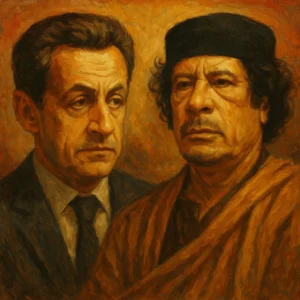The Pact of Betrayal: Sarkozy, Gaddafi and NATO’s War on Africa
TRANSCEND MEMBERS, 27 Oct 2025
Raïs Neza Boneza – TRANSCEND Media Service
22 Oct 2025 – When Nicolas Sarkozy first met Muammar Gaddafi, he called him “Monsieur le Guide” — a gesture of respect that would soon rot into betrayal.
In 2007, the Libyan leader was received in Paris with red carpets and diplomatic smiles. His tent was pitched on the Champs-Élysées, a symbol of renewed Franco-African friendship. Behind the velvet words, however, a secret deal was already being written — one that would stain both men forever.
According to later investigations, millions of euros from Gaddafi’s regime allegedly financed Sarkozy’s presidential campaign. Gaddafi saw the arrangement as an investment in a future partnership: a united Africa, free from Western tutelage, with its own currency and defense force. Sarkozy saw only a quick injection of money and influence.
Their pact was not one of friendship but of convenience — and convenience, in politics, is short-lived.
From ally to enemy
When Gaddafi began calling for an African Monetary Fund and a pan-African army, Western capitals panicked. The idea of a self-sufficient Africa threatened centuries of economic dependency built on oil, gold, uranium and the CFA franc. Overnight, the Libyan “partner” became a “dictator.”
The same media that once praised Gaddafi as a reformer suddenly branded him the new Saddam Hussein.
The transformation was complete by March 2011. Under the banner of humanitarian intervention, NATO launched air strikes on Libya. France led the assault, with the United States and the United Kingdom in command — and Norway, a supposed beacon of peace, quietly joining the bombing campaign. Norwegian F-16s dropped nearly 600 bombs. The official story spoke of saving lives; the reality was regime change, plain and brutal.
The “humanitarian” war
Within months, Libya — once Africa’s most prosperous nation — was reduced to rubble. Its leader was captured, tortured and lynched. His corpse, displayed like a trophy, symbolized the arrogance of an empire convinced of its impunity.
What followed was not democracy but disintegration. Militias carved up the country; open-air slave markets returned; weapons from Libyan stockpiles flooded into the Sahel, fueling insurgencies across Mali, Niger and Chad.
Each time instability appeared, French troops followed — ostensibly to “fight terrorism.”
In truth, Paris was protecting its mining and energy assets: Areva’s uranium in Niger, Total’s oil in Chad, and gold in Mali. Operation Serval became Operation Barkhane, and the rhetoric of security masked a continuation of economic control.
The empire unravels
Today, the picture has flipped. Sarkozy, once untouchable, has been convicted for corruption and illegal campaign financing in connection with the Libyan affair. Five years in prison, pending appeal — the symbolic fall of a man who once believed himself above history.
Across Africa, French troops are not anymore welcome under the pressure of popular uprisings in Mali, Burkina Faso and Niger. The youth of the continent are rejecting the language of “partnership” that too often means occupation.
Meanwhile, France faces economic decline and political fragmentation. Deprived of Africa’s resources and markets, the old empire is collapsing under its own contradictions. The same NATO war that promised to secure influence in North Africa instead accelerated its erosion.
Norway’s quiet complicity
Norway’s role in this tragedy remains largely unspoken. The nation that hosts the Nobel Peace Prize allowed its planes to participate in one of the most disastrous interventions of the century. No official inquiry, no apology, no reckoning. Oslo’s silence is an eloquent reminder that moral superiority can coexist with moral blindness.
Lessons from a betrayal
The Sarkozy-Gaddafi saga is more than a scandal of money and politics. It is the allegory of the entire colonial relationship between Europe and Africa: promises of friendship ending in betrayal, the language of progress masking the machinery of exploitation.
When Gaddafi dreamed of a self-determined Africa, he signed his own death warrant. When Sarkozy ordered the bombs that silenced him, he signed the death warrant of France’s credibility on the continent.
History moves in circles. Yesterday, Africans were chained. Today, the former colonizers are shackled by debt, corruption and decline. What was once called “aid” is now called “investment,” but the dynamics remain the same — until they don’t.
A generation across Africa is awakening. They see through the lies of “humanitarian” wars and “development” loans. They are reclaiming their resources, their dignity and their future.
And they know one truth that no empire has ever survived: you cannot bomb a people into submission forever.
____________________________________________
 Raïs Neza Boneza is the author of fiction as well as non-fiction, poetry books and articles. He was born in the Katanga province of the Democratic Republic of Congo (Former Zaïre). He is also an activist and peace practitioner. Raïs is a member of the TRANSCEND Media Service Editorial Committee and a convener of the TRANSCEND Network for Peace Development Environment for Central and African Great Lakes. He uses his work to promote artistic expressions as a means to deal with conflicts and maintaining mental wellbeing, spiritual growth and healing. Raïs has travelled extensively in Africa and around the world as a lecturer, educator and consultant for various NGOs and institutions. His work is premised on art, healing, solidarity, peace, conflict transformation and human dignity issues and works also as freelance journalist. You can reach him at rais.boneza@gmail.com – http://www.raisnezaboneza.no
Raïs Neza Boneza is the author of fiction as well as non-fiction, poetry books and articles. He was born in the Katanga province of the Democratic Republic of Congo (Former Zaïre). He is also an activist and peace practitioner. Raïs is a member of the TRANSCEND Media Service Editorial Committee and a convener of the TRANSCEND Network for Peace Development Environment for Central and African Great Lakes. He uses his work to promote artistic expressions as a means to deal with conflicts and maintaining mental wellbeing, spiritual growth and healing. Raïs has travelled extensively in Africa and around the world as a lecturer, educator and consultant for various NGOs and institutions. His work is premised on art, healing, solidarity, peace, conflict transformation and human dignity issues and works also as freelance journalist. You can reach him at rais.boneza@gmail.com – http://www.raisnezaboneza.no
Tags: Africa, Corruption, France, Muammar Qaddafi, Nicolas Sarkozy
DISCLAIMER: The statements, views and opinions expressed in pieces republished here are solely those of the authors and do not necessarily represent those of TMS. In accordance with title 17 U.S.C. section 107, this material is distributed without profit to those who have expressed a prior interest in receiving the included information for research and educational purposes. TMS has no affiliation whatsoever with the originator of this article nor is TMS endorsed or sponsored by the originator. “GO TO ORIGINAL” links are provided as a convenience to our readers and allow for verification of authenticity. However, as originating pages are often updated by their originating host sites, the versions posted may not match the versions our readers view when clicking the “GO TO ORIGINAL” links. This site contains copyrighted material the use of which has not always been specifically authorized by the copyright owner. We are making such material available in our efforts to advance understanding of environmental, political, human rights, economic, democracy, scientific, and social justice issues, etc. We believe this constitutes a ‘fair use’ of any such copyrighted material as provided for in section 107 of the US Copyright Law. In accordance with Title 17 U.S.C. Section 107, the material on this site is distributed without profit to those who have expressed a prior interest in receiving the included information for research and educational purposes. For more information go to: http://www.law.cornell.edu/uscode/17/107.shtml. If you wish to use copyrighted material from this site for purposes of your own that go beyond ‘fair use’, you must obtain permission from the copyright owner.
Join the discussion!
We welcome debate and dissent, but personal — ad hominem — attacks (on authors, other users or any individual), abuse and defamatory language will not be tolerated. Nor will we tolerate attempts to deliberately disrupt discussions. We aim to maintain an inviting space to focus on intelligent interactions and debates.
